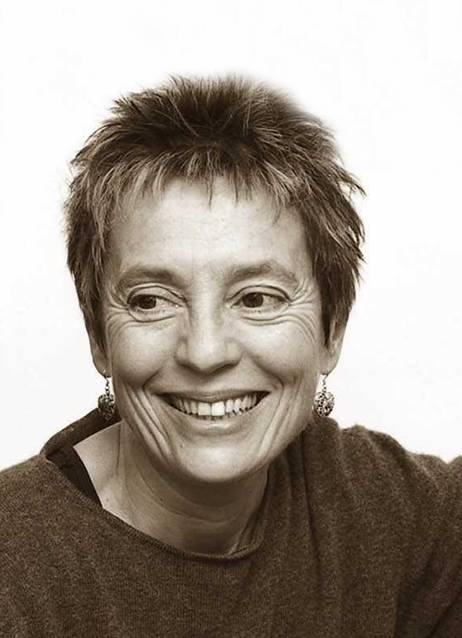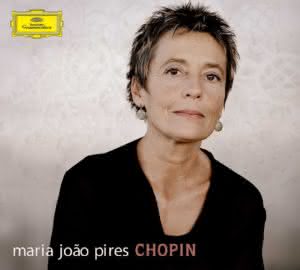Dando continuidade à Semana Chopin, trago esta gravação elogiadíssima da Deutsche Grammophon. Com o perdão da expressão, este é um CD do cacete. A portuguesa Maria João Pires está beirando a perfeição com sua emocionante interpretação da Sonata n°3, uma das melhores que já tive a oportunidade de ouvir.Como diria o mano PQP, é para se ouvir de joelhos. A escolha do repertório não foi aleatória. Pires escolheu peças compostas nos últimos cinco anos de vida do compositor, e são uma perfeita síntese da incrível capacidade de Chopin de compreender a alma humana. Ou seja, tratam-se de obras maduras, interpretadas por uma intérprete no apogeu de sua maturidade artística.
Abaixo, a continuação da biografia do genial Chopin, tirado do site http://www.chopin.pl/biography_chopin.en.html :
From 1823 to 1826, Fryderyk attended the Warsaw Lyceum where his father was one of the professors. He spent his summer holidays in estates belonging to the parents of his school friends in various parts of the country. For example, he twice visited Szafarnia in the Kujawy region where he revealed a particular interest in folk music and country traditions. The young composer listened to and noted down the texts of folk songs, took part in peasant weddings and harvest festivities, danced, and played a folk instrument resembling a double bass with the village musicians; all of which he described in his letters. Chopin became well acquainted with the folk music of the Polish plains in its authentic form, with its distinct tonality, richness of rhythms and dance vigour. When composing his first mazurkas in 1825, as well as the later ones, he resorted to this source of inspiration which he kept in mind until the very end of his life.
In the autumn of 1826, Chopin began studying the theory of music, figured bass and composition at the Warsaw School of Music, which was both part of the Conservatory and, at the same time, connected with Warsaw University. Its head was the composer Jozef Elsner (b. 1769 in Silesia). Chopin, however, did not attend the piano class. Aware of the exceptional nature of Chopin’s talent, Elsner allowed him, in accordance with his personality and temperament, to concentrate on piano music but was unbending as regards theoretical subjects, in particular counterpoint. Chopin, endowed by nature with magnificent melodic invention, ease of free improvisation and an inclination towards brilliant effects and perfect harmony, gained in Elsner’s school a solid grounding, discipline, and precision of construction, as well as an understanding of the meaning and logic of each note. This was the period of the first extended works such as the Sonata in C minor, Variations, op. 2 on a theme from Don Juan by Mozart, the Rondo à la Krakowiak, op. 14, the Fantaisie, op. 13 on Polish Airs (the three last ones written for piano and orchestra) and the Trio in G minor, op. 8 for piano, violin and cello. Chopin ended his education at the Higher School in 1829, and after the third year of his studies Elsner wrote in a report: “Chopin, Fryderyk, third year student, amazing talent, musical genius”.
After completing his studies, Chopin planned a longer stay abroad to become acquainted with the musical life of Europe and to win fame. Up to then, he had never left Poland, with the exception of two brief stays in Prussia. In 1826, he had spent a holiday in Bad Reinertz (modern day Duszniki-Zdroj) in Lower Silesia, and two years later he had accompanied his father’s friend, Professor Feliks Jarocki, on his journey to Berlin to attend a congress of naturalists. Here, quite unknown to the Prussian public, he concentrated on observing the local musical scene. Now he pursued bolder plans. In July 1829 he made a short excursion to Vienna in the company of his acquaintances. Wilhelm Würfel, who had been staying there for three years, introduced him to the musical milieu, and enabled Chopin to give two performances in the Kärtnertortheater, where, accompanied by an orchestra, he played Variations, op. 2 on a Mozart theme and the Rondo à la Krakowiak, op. 14 , as well as performing improvisations. He enjoyed tremendous success with the public, and although the critics censured his performance for its small volume of sound, they acclaimed him as a genius of the piano and praised his compositions. Consequently, the Viennese publisher Tobias Haslinger printed the Variations on a theme from Mozart (1830). This was the first publication of a Chopin composition abroad, for up to then, his works had only been published in Warsaw.
Problemas com minha conexão com a internet tem me deixado deveras aborrecido. Foram quatro as tentativas para subir este arquivo para o Megaupload.
Frédéric Chopin (1810-1849):
Sonatas, Noturnos, Mazurkas, Valsas (link revalidado por PQP)
CD 1
01.01 – Sonata n 3 Sim, Op 58 (1)
01.02 – Sonata n 3 Sim, Op 58 (2)
01.03 – Sonata n 3 Sim, Op 58 (3)
01.04 – Sonata n 3 Sim, Op 58 (4)
01.05 – Nocturnos Op 62 (1)
01.06 – Nocturnos Op 62 (2)
01.07 – Mazurkas Op 59 (1)
01.08 – Mazurkas Op 59 (2)
01.09 – Mazurkas Op 59 (3)
CD 2
02.01 – Polonaise-Fantaisie in A flat major. op.61
02.02 – Mazurkas op. 63
02.03 – Mazurkas op. 63
02.04 – Mazurkas op. 63
02.05 – 3 Valses op. 64
02.06 – 3 Valses op. 64
02.07 – 3 Valses op. 64
02.08 – Mazurkas op. 67 no. 2 & no. 4
02.09 – Mazurkas op. 67 no. 2 & no. 4
02.10 – Sonata for violoncello and Piano in G minor. op. 65
02.11 – Sonata for violoncello and Piano in G minor. op. 65
02.12 – Sonata for violoncello and Piano in G minor. op. 65
02.13 – Sonata for violoncello and Piano in G minor. op. 65
02.14 – Mazurka op. 68 no.4
Maria João Pires – Piano
Pavel Gomziakov – Cello

FDP

No Youtube há um documentario bem interessante sobre Chopin, apresentado pelo pianista András Schiff : http://www.youtube.com/watch?v=P-tpRMb6aEw
abs,
soares
Fantástico post!!!
Aqui o EPK da Deutsche Grammophon, com a Pires falando sobre o cd:http://www.youtube.com/watch?v=MKJpV5x62uI
Cheers!
Faltou no post uma referência ao nome do intérprete na sonata para cello e piano. Vou baixar em seguida. Ótima escolha. Obrigado e abraços.
PS. Mandei a capa do CD de Benito Juarez. Vocês receberam?
Desculpe, realmente esqueci do violoncelista. Ele se chama Pavel Gomziakov.
A gravação é incrível, mas não consigo sincronizar a faixa 2, não sei se há algum problema com o arquivo. Qualquer coisa, avise. Abraços.
Por favor, desconsidere o “problema” da sincronização. Quem estava com problemas mesmo eram meus neurônios. Quanto à gravação: houve tempo em que eu só admitia ouvir Chopin nas mãos de Rubinstein (abria uma ligeira excessão para Brailowsky, Nelsinho e Dna Guiomar). O tempo passou e, como eu suspeitava por algunas leituras, MJP é de arrasar. Obrigado novamente pela generosidade do post.
Benedetto, eu também sofria deste “mal”: só admitia Chopin pelas mãos do Rubinstein. Mas o bom velhinho já morreu há trinta anos, portanto, vamos dar uma chance à nova geração. Assim como com Chopin, eu também só admitia Beethoven e Schumann com outro genial velhinho, Wilhelm Kempff. Mas graças à este magnífico recurso chamado internet, consegui conhecer toda uma geração que de outra forma eu jamais teria acesso.
Por falar em outros intérpretes, aguardo ansioso o novo cd do Nelson Freire dedicado aos noturnos. E vão vir outros cds da Maria João aí pela frente. Já sou fá da portuguesa hpa alguns anos.
dá para fazer um reup deste disco? O link não tá mais disponível… (PQP, parece que tou buscando franjinhas soltas em sua discografia que já não estão disponíveis, mas não é assim. É pura casualidade, sorry.